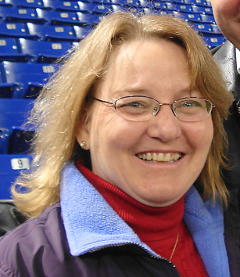A Consultant's Perspective

Why did you decide to join the Advisory Committee of Connecting the Dots?
I represent the Adult Learning Knowledge Centre on the Advisory Committee. The AdLKC is one of five knowledge centres created by the Canadian Council on Learning. The AdLKC has a committee on monitoring and reporting on adult education, which led to having the AdLKC coordinator Kathleen Flanagan being invited to sit on the advisory committee. Due to her time commitments, she was unable to take on this role herself so she asked me to do it.
I was pleased to become involved in this issue. I had personal experience with issues of accountability both within and outside government and had been at HRSDC during the grants and contributions ‘crises. The issues of accountability, measurement, and indicators of success have interested me for some time. I have struggled to come up with alternative approaches to the quantitative measures so popular today so that we can make meaningful the impact of the work of the literacy field. Connecting the Dots was an excellent opportunity to examine these issues in detail and to be part of a national dialogue on the subject.
You attended the CtD symposium, Moving the Conversation Forward, in May 2008. Could you share your impressions of the event?
The session involved about 70 people from across the country – participants came from the steering committee (the four sponsors of the project); the advisory committee; the field reviewers; members of the action research teams; and various practitioners, academics and funders.
The symposium was one of the best I’ve attended. The facilitation was superb with a bilingual facilitator, Lise Pigeon, who I would not hesitate to recommend. Linda Shohet and David Hurley from the Centre for Literacy provided much of the conceptual thinking around the project while Marina Niks and her team of field reviewers did an incredible job of distilling over 130 interviews and several focus groups.
The two guest speakers were an enormous value add. Jan Eldred from the UK (who was sponsored by the AdLKC) provided an overview of the UK situation with much food for thought for Canadians. Gilles Paquet of the University of Ottawa was a provocative commentator on the state of (over)accountability in Canada at the national level.
There was a power and an energy at the session and, I believe, a strong sense of the need for the literacy community (and others) to acknowledge the reality of accountability and find ways to make this work.
What stuck out for you about the findings reported from the field interviews with practitioners and funders? Did you find any differences or similarities between what was reported and the input or opinions of the symposium attendees?
The symposium was able to take the information from the field interviews to the next level. The interviews gave separate and discrete pieces of information. At the symposium, because of the various groups represented and the incredible level of discussion, we were able to interweave the complexity of the issue of accountability into to ‘facts’ of the interviews.
The most interesting discussion was about how the literacy community needs to be politically savvy to ensure its needs and those of the learners are being met within an accountability regime that has to meet a variety of expectations. Sometimes the people who agree to the expectations are not the people actually doing the work that would meet the expectations.
The question of performance came up repeatedly – what are the indicators for success and who determines them. This might mean agreeing on a definition of literacy. Performance is not just about outputs and outcomes, it is also about inputs. So expectations need to include things like ‘stuff happens’.
How one goes about meeting the obligations and how it is measured is too often a question of whether someone enforces a policy and who holds the power. Often there is a dominant understanding of the terms and expectations that might not be shared throughout (e.g., the understanding of the minister vs. the understanding of the front line bureaucrat). Power and creativity do not often mix well.
Accountability is seen often as an imposition. It is important to negotiate the language of the bureaucracy and the funder. The funder cannot do what they want in terms of achieving a policy end without us – we need to recognize our power. We have the responsibility to understand their world and vice versa. We need to take on an activist rather than a victim perspective and “scheme virtuously” (a delightful phrase) to engage the funder.
Any final thoughts you would like to share about ways that funders and practitioners can work together to improve accountability practices?
There is not a great deal of understanding by funders and the literacy community of each other’s worlds. Many public officials have not worked for non-profits, while many literacy practitioners have little experience with the regimes under which public servants work. Opportunities to exchange experiences and realities would be helpful. One of the more interesting outcomes of the symposium was the increased understanding by practitioners and funders of each other’s realities.

